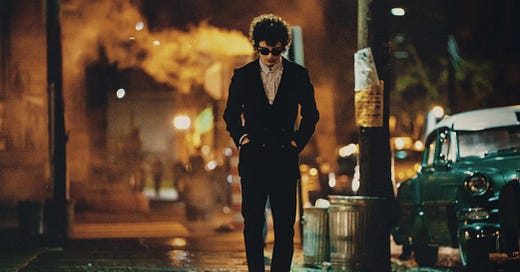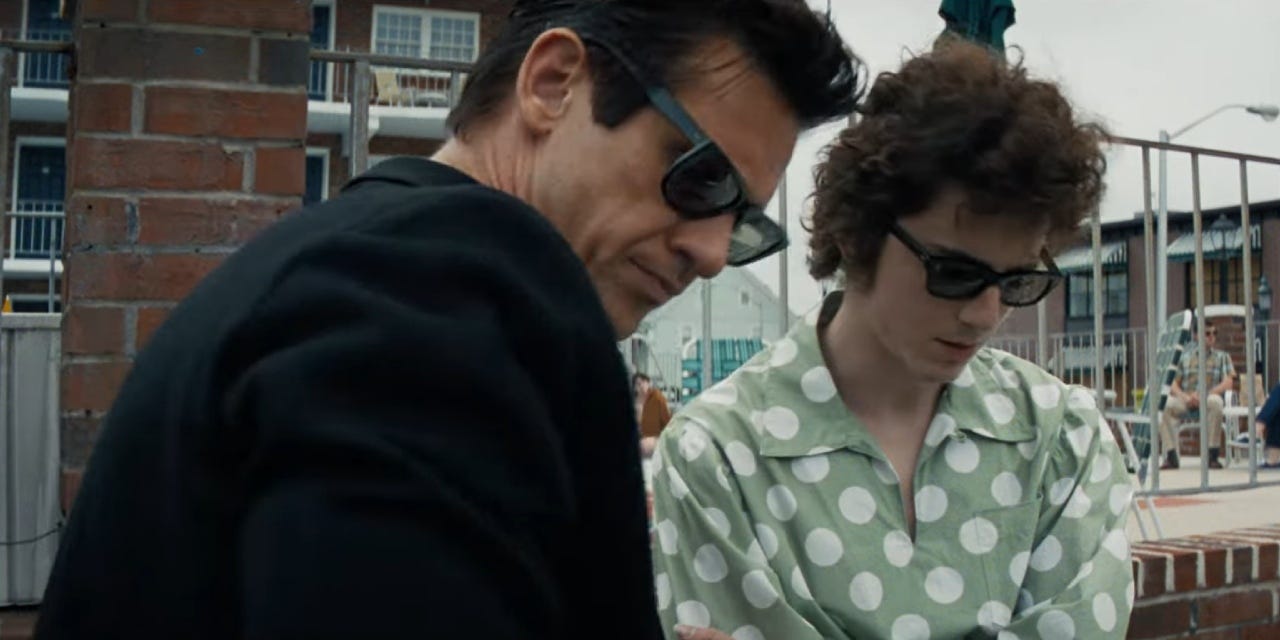Cinematic Addict: A headful of ideas about *A Complete Unknown* that’re driving me insane!
James Mangold’s much-ballyhooed Bob Dylan biopic races through history with a protagonist less sharply-drawn than the supporting players.
Chalamet as Dylan: He doesn’t want it! Give it to Donovan! (Pic: Macall Polay, courtesy of Searchlight Pictures)
“You came here with nothing but a guitar,” Elle Fanning’s Sylvie Russo (this film’s Suze Rotolo avatar) admonishes her boyfriend, Bob Dylan (as portrayed by that guy who doesn’t know how to spell our shared first name, Timothée Chalamet). This happens about 30 minutes into director James Mangold’s much-ballyhooed biopic A Complete Unknown (Searchlight Pictures, Rated R, 141 minutes). “You never talk about your family, your past…”
“People make up their past, Sylvie!” Chalamet/Dylan fires back, in a well-executed impersonation. “They remember what they want, they forget the rest!”
This explains the core dilemma with an otherwise excellent movie about Bob Dylan: Every character but the main one feels sharply defined and three-dimensional. In fact, if Edward Norton does not bag a Best Supporting Actor Oscar for his portrayal of Pete Seeger, it will prove the Academy of Motion Picture Arts and Sciences is blind.
But Dylan is practically a blank canvas for much of the film—a non-presence that others react to. He shakes up everyone and everything who encounters him, but it’s as if he does not himself exist.
Perhaps that’s the point.
One of the many things Dylan perfected was the art of reinvention. Robert Zimmerman’s creation was sent out there to deliver these songs that blow everyone—himself included—away. Dylan remarked in his book Chronicles, Vol. One he didn’t know where they came from, that they felt like gifts bestowed upon him. Everybody from Bowie to Madonna learned the reinvention trick from Dylan, as well as the fact that retaining the public’s fascination involves continual reinvention. As Chalamet/Dylan explains to Fanning/Russo in an earlier scene, “If anyone’s gonna hold your attention on a stage, you have to kind of be a freak. You can be beautiful or you can be ugly, but you can’t be plain.”
The major plot of this chronicle of Dylan’s first five years is his evolution from the weird hick kid idolizing Woody Guthrie (Scoot McNairy) to the figure Seeger, Joan Baez (Monica Barbaro), and other denizens of the Greenwich Village scene want him to be — the savior of folk music. By 1965, he’s fully the electric rock ‘n’ roll troubadour in black leather and polka dots, rattling the cage of a rapidly changing world.
In the course of becoming increasingly famous, he reacts to the myriad expectations placed upon his wiry shoulders as only a contrarian can: “200 people in that room, and each one wants me to be somebody else,” he fumes after leaving a party where he’s trotted out like some prize showhorse. “They should just let me be.”
“Let you be what?” asks one of the other passengers in the elevator spiriting Dylan and his date from the party—his soon-to-be road manager/court jester Bob Neuwirth (Will Harrison).
“Whatever it is they don’t want me to be,” Chalamet/Dylan snorts.
As we know, that’s been Dylan’s M.O. for his entire career: wilfully and deliberately confounding expectations, keeping everyone wondering, “What the fuck’s he doing NOW?!” If anything, A Complete Unknown demonstrates that this ducking and weaving was set in stone during those first five years, ensuring that the only consistency in his artistry was constant change. Bob Dylan would forevermore remain a walking, talking, guitar-strumming, harmonica-wheezing cipher who also happened to write some of the 20th century's most deathless songs.
So, is it any wonder that, despite Chalamet’s much-vaunted method acting portrayal of young Dylan, he still comes off as essentially a really good Bob Dylan impersonator? Because there’s no Robert Zimmerman in there—just an accurate representation of this continually evolving persona?
But the twitchiness, the quirky mannerisms, the reedy voice seemingly permanently suffering from an ever-present sinus condition—they’re all there, captured with eerie accuracy. Chalamet knows his craft, and he’s damned good in the role. He’s not exactly channeling Dylan the way Austin Butler did Elvis Presley or Jim Carrey did Andy Kaufman. But how can you embody a persona when that persona is all there is, even to those purportedly closest to him, like live-in lover Russo/Rotolo? Nobody knew Bobby Zimmerman except the folks back home!
It’s a good thing Mangold and Yesi Ramirez made such strong casting decisions. Everyone surrounding Chalamet’s portrayal of all these different guys named “Bob Dylan” are more vividly drawn, flesh-and-blood, honest-to-Jah human beings, even when it's the renamed Suze Rotolo. Therefore they need acting chops at least Chalamet’s equal, if not their superior. Barbaro’s Baez and particularly Norton’s Seeger are amazing, three-dimensional renderings of their real-life counterparts.
Johnny Cash (Boyd Holbrook) encouraging Dylan (Chalamet) the morning of The Battle Of Newport in A Complete Unknown. (Courtesy of Searchlight Pictures)
Meanwhile, Boyd Holbrook’s Johnny Cash is so Johnny Cash, you wish Mangold would reshoot his nearly 20-year-old Walk The Line with HIM—Holbrook makes Joaquin Phoenix’s portrayal resemble a cartoon character. Cash exists in A Complete Unknown as Dylan’s sole voice of reason, their friendship beginning with a fan letter. As Dylan navigates the circus of his skyrocketing career, Cash—having weathered similar storms—becomes a steadying presence. While Seeger and Alan Lomax (Norbert Leo Butz) push back on Dylan’s shift from his Martin 00-17 to a Fender Stratocaster, Cash stands out as one of the few voices of encouragement, alongside Dylan’s bulldog manager, Albert Grossman (Dan Fogler).
The morning of the infamous 1965 Newport Folk Festival, which serves as the film’s climax, Dylan laments that no one wants to hear his new direction. Cash leans in and reassures him: “I do.” In a time compression sure to irk historical purists, the film shows Cash handing Dylan his Gibson at Newport in ’65, even though this occurred a year earlier. Yet the moment resonates, perfectly capturing Cash’s quiet, unwavering support.
(Incidentally–and this is all but glossed over by the film—Cash actually brought electric guitars to Newport in ‘64 without backlash, presumably because country music’s somehow more “authentic.”)
But rock ‘n’ roll fans are always more critical of biopics than anyone else. Somehow or other, films like A Complete Unknown should be a documentary with actors, as if Martin Scorsese cast Timothée Chalamet to star in No Direction Home, instead of relying on actual historical footage. A r’n’r biopic is apparently not supposed to be historical fiction. Apparently, they are to be absolutely authentic, in documenting a form frequently devoid of authenticity.
No one considers that such films would end up three hours long instead of around 90 minutes. True, this involves the kind of time compression discussed earlier. For instance, Dylan visits Guthrie in the hospital within hours of arriving in NYC and plays him “Song to Woody,” a tune that in reality hadn’t been written yet. It leads to moments like folding the 1966 Manchester “Judas”/”I don’t believe you! You’re a liar”/”Play fucking loud” incident into Newport ‘65. Suze Rotolo becomes “Sylvie Russo” (at Dylan’s request), Dave Van Ronk (Joe Tippett) is reduced to two scenes, and crucial figures like Ramblin’ Jack Elliott are ignored completely. It also results in utter fictionalizations, like Seeger’s being present at that first visit to Guthrie, bringing the new-to-town Dylan home to his family to spend the night. Or Grossman brawling with Lomax as Dylan and the Butterfields drop a 20 megaton bomb on Newport called “Maggie’s Farm.”
But compared to a lot of such pictures, A Complete Unknown’s Hollywood crimes are minimal. Have you watched The Buddy Holly Story lately? It’s eye-rolling, watching Gary Busey-as-Buddy-Holly playing mid-’70s Strats, or seeing The Crickets’ Jerry Allison and Joe B. Mauldin renamed “Jesse” and “Ray Bob.” A Complete Unknown is most decidedly NOT The Buddy Holly Story. It’s not even I’m Not There, Todd Haynes’ utterly bizarre 2007 attempt at a Dylan “biopic.”
The film’s attention to historical detail is remarkable, from transforming Jersey City and Hoboken into early ‘60s NYC to using period-correct instruments and microphones. The actors all own their roles to a degree rarely seen, which particularly lends Norton’s avuncular portrayal of Seeger surprising gravitas and believability. Even Chalamet’s Dylan feels definitive. He skillfully portrays several personae, all named “Bob Dylan,” rather than a single, tangible human being.
Having the actors perform their own material on camera, rather than lip-synching to studio tracks, is one of the production’s most inspired choices. Every actor owns their characters’ songs, to the point where you wonder if it’s Barbaro or Baez. Chalamet’s Dylan performances all resemble alternate takes, and Holbrook’s romps through “Big River” and “Folsom Prison Blues” could likely fool Cash’s children. The result is a surprisingly listenable soundtrack.
Ultimately, A Complete Unknown walks the fine line between reverence and reinvention. Its creative liberties may bristle purists, but its heartfelt performances and attention to period detail remind us why Dylan’s story endures. If rock ‘n’ roll fans demand perfection from their biopics, maybe it’s because Dylan, Cash, and their peers set the bar impossibly high to begin with. For all its flaws, A Complete Unknown captures the spirit of those turbulent times and the artists who defined them—messy, mythic, and utterly human.
Keep the Music (and the Words) Alive: Support The Tim “Napalm” Stegall Substack
Napalm Nation, the work I pour into The Tim “Napalm” Stegall Substack is a labor of love—and it’s only possible with your support. If this post about A Complete Unknown, or any of my writing, has sparked curiosity, offered fresh insights, or simply resonated with you, here’s how you can help keep it going:
Option 1: The Year-End Subscription Special
Through December 31st, I’m offering 20% off all paid subscriptions—for life. It’s the perfect time to join as a paying subscriber or upgrade your free subscription. Every contribution helps fuel independent, unfiltered music journalism year-round.
Option 2: The Lifetime Subscription via GoFundMe
If you’d like to lend an extra hand, I’m running a GoFundMe campaign to close a gap on back rent. Here’s how you can get involved:
Sign up for a free subscription.
Donate $50 or more to https://gofund.me/6ed3b451.
Send me a private message to confirm your donation.
As a thank-you, I’ll gift you a full lifetime subscription to the Substack.
Your support helps keep this space alive for fearless writing and deep dives into music, culture, and everything in between.
Thank you for reading and for believing in independent punk journalism.
Tim “Napalm” Stegall
#TimNapalmStegallSubstack #TimNapalmStegall #CinematicAddict #MovieReview #ACompleteUnknown #BobDylanBiopic #BobDylan #JamesMangold #TimothéeChalamet #EdwardNorton #PunkJournalism #MusicWriting #IndieMedia #SupportIndependentJournalism #SubstackWriters #DIYMedia #PunkPerspective #SubscribeNow #GoFundMe #KeepTheDreamAlive





Excellent analysis. As a wise man once said, "Purists can blow me." Oh wait, that was me.
One of your best that I’ve read Tim!
I really enjoyed this movie. I laughed a lot but not derogatory laughter. Great performances all around.